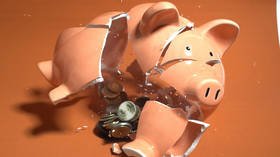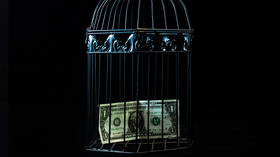European economy slides into double-dip recession after new Covid-19 wave
Both the EU and the eurozone economies are facing a second recession in just over a year, continuing to shrink in the first three months of 2021, according to preliminary estimates released by Eurostat.
Gross domestic product (GDP) in the 19 countries sharing the euro contracted 0.6% quarter-on-quarter in January through March, while the wider EU economy was down 0.4%, the statistical office said on Friday. Year-on-year, the euro area economy shrank by 1.8%, while output in the 27-nation bloc declined 1.7%.
Also on rt.com EU response to Covid-19 pandemic has cost six million jobs, young workers worst affectedThe EU and the euro area faced declines in the final three months of 2020 as a new wave of Covid-19 hit the continent. That means that the region is currently in a technical recession again, defined as two consecutive quarters of negative growth.
Europe is now in a double-dip recession, a situation when a recession is followed by a short-lived recovery and another recession. The first recession hit in the first half of 2020, when the coronavirus crisis led to lockdowns which shut most businesses, before rebounding in the third quarter.
Also on rt.com Russia-EU trade turnover plunged over 20% in 2020The bloc’s largest economy, Germany, was among three EU members facing the biggest contractions in January-March. Germany has the highest year-on-year decrease in GDP after Portugal and Spain, which stands at 3%. The German economy also fell by 1.7% compared to the previous quarter.
However, some economists point out that the situation is set to improve later this year, as vaccinations will help governments to ease coronavirus restrictions and boost recovery.
“However, speed aside, it is moving in the right direction – particularly as the vaccine roll out gathers pace,” Robert Alster, CIO at wealth manager Close Brothers Asset Management, said as cited by Yahoo Finance. He added that the summer months are “crucial for southern Europe’s road to recovery,” especially for tourism-reliant states.
For more stories on economy & finance visit RT's business section














